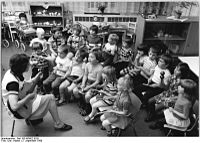
Photo from wikipedia
Music psychologists have established that some forms of musical activity improve intellectual performance, spatial–temporal reasoning and other skills advantageous for learning. In this research, the potential of active music-making for… Click to show full abstract
Music psychologists have established that some forms of musical activity improve intellectual performance, spatial–temporal reasoning and other skills advantageous for learning. In this research, the potential of active music-making for improving pupils' achievement in spatial– temporal reasoning was investigated. As spatial–temporal skills are considered to be high-level mathematical abilities, this study also aimed to explore if learning music might have an effect on pupils' achievement in mathematics, and whether spatial–temporal reasoning plays a role in this process. The study had a quasi-experimental design in which groups of children aged 4 to 7 participated in a music programme containing a variety of musical, predominantly rhythmical, activities. Parallel classes made up control groups. Throughout the intervention, pupils' attainment in mathematics, reading, writing and spatial–temporal reasoning was recorded and compared between the music and control groups. The findings of the project supported the hypothesis that music instruction has an impact on the development of spatial–temporal skills. A statistically significantly greater progression was observed in most of the intervention groups, as compared in all periods of measurement to the control groups. The attainment in general mathematics did not always differ between the intervention and control groups but the analyses provided evidence of a consistent and statistically significant enhancement in learning mathematics between the youngest participants of the programme. This knowledge could inform pedagogical practice, while further research in this area could offer more insight into the association between music and mathematics.
Journal Title: London Review of Education
Year Published: 2017
Link to full text (if available)
Share on Social Media: Sign Up to like & get
recommendations!